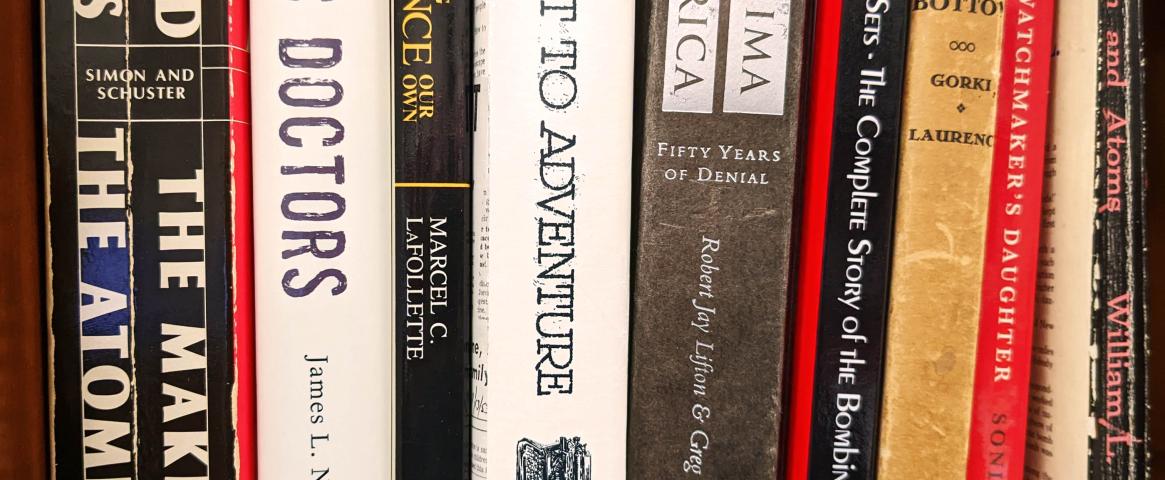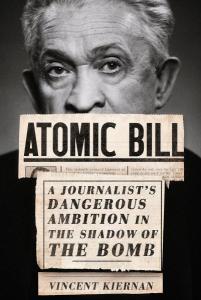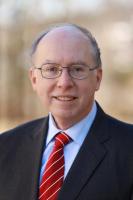
Vincent Kiernan—Atomic Bill: A Journalist’s Dangerous Ambition in the Shadow of the Bomb
A JOURNALIST’S DANGEROUS AMBITION
IN THE SHADOW OF THE BOMB
Vincent Kiernan
Cornell University Press/Three Hills, Nov. 15, 2022
Hardcover, $32.95; ebook, $15.99
ISBN-13: 9781501765636
ASIN: B09SK2FLN8
Kiernan reports:
Almost 40 years ago, I was a local newspaper reporter covering two of the nation’s nuclear weapons laboratories in Livermore, Calif. The experience left me with an abiding interest in how reporters cover, or don’t cover, the nation’s nuclear arsenal.
I’ve long been interested in William Laurence, who worked at The New York Times as a science journalist and science editor. I originally thought a chapter about him in a book about the history of science journalism would do him justice. But the more I looked into him, the more flawed–and therefore interesting–I found him to be. I judged that it was time to dig deeply and write about him.Laurence has long been the center of controversy. To some, he was a despicable propagandist defending the Bomb; to others, he was a skilled science communicator whose diligent efforts provided the public with deep understanding of that same Bomb. But no one has provided a textured look at Laurence himself.
This book reveals how Laurence’s deeply flawed ethics pervaded his entire career as a journalist. As one of the early science journalists, Laurence helped set the pattern for how journalists long covered science and technology: he emphasized discoveries over serious consideration of the role of science and technology in society.
Laurence’s story shows the danger posed by journalists who lose their focus on serving the public and instead center on fame, fortune, and being close to those in power. After World War II, Laurence spent much of his energy building his new atomic brand through extracurricular activities such as speechmaking, book writing, and broadcasting. In this era, he rarely produced any important news about the United States’ nuclear programs for readers of The New York Times.
He instead shared his insights and tidbits of news for his other projects, and he even went out of his way to try to debunk reporting by other reporters who sought to pierce the nuclear programs’ curtain of secrecy. Laurence lost his way as a reporter serving the public.
Contact info:
- Vincent Kiernan, 703 507 0234; kiernan@nasw.org; Twitter @vincentkiernan; Instagram: @vincent.kiernan
- Book: https://www.cornellpress.cornell.edu/book/9781501765636/atomic-bill/
- Publicist: Sarah Noell, scn47@cornell.edu
NASW members: will your book be published soon? Promote it by submitting your report for Advance Copy.
Tell your fellow NASW members how you came up with the idea for your book, developed a proposal, found an agent and publisher, funded and conducted research, and put the book together. Include what you wish you had known before you began working on your book, or had done differently.
See https://www.nasw.org/advance-copy-submission-guidelines.
View Advance Copy archives at https://www.nasw.org/member-article/advance-copy.
Thinking of writing a book? If you are a NASW member, you may access a list of more than 200 books and online resources to help you craft your book proposal, find an agent and funding sources, negotiate your contract, learn about self-publishing, publicize and market your book, and more at https://www.nasw.org/article/write-book.
Send book info and questions about book publishing to Lynne Lamberg, NASW book editor, llamberg@nasw.org.
Follow @LynneLamberg on Twitter for news about science/medical books, writing, and NASW authors.
Banner image adapted from original photo by Vincent Kiernan. NASW members: Share photos of your office bookshelves for use on our website. Upload photos to bit.ly/naswpicsubmit.
Advance Copy
The path from idea to book may take myriad routes. The Advance Copy column, started in 2000 by NASW volunteer book editor Lynne Lamberg, features NASW authors telling the stories behind their books. Authors are asked to report how they got their idea, honed it into a proposal, found an agent and a publisher, funded and conducted their research, and organized their writing process. They also are asked to share what they wish they’d known when they started or would do differently next time, and what advice they can offer aspiring authors. Lamberg edits the authors’ answers to produce the Advance Copy reports.
NASW members: Will your book be published soon? Visit www.nasw.org/advance-copy-submission-guidelines for information on submitting your report.
Publication of NASW author reports in Advance Copy does not constitute NASW's endorsement of any publication or the ideas, values, or material contained within or espoused by authors or their books. We hope this column stimulates productive discussions on important topics now and in the future as both science and societies progress. We welcome your discussion in the comments section below.





